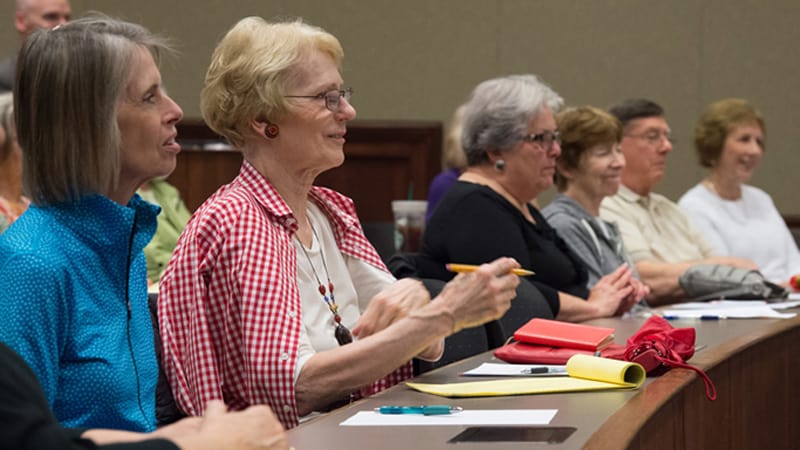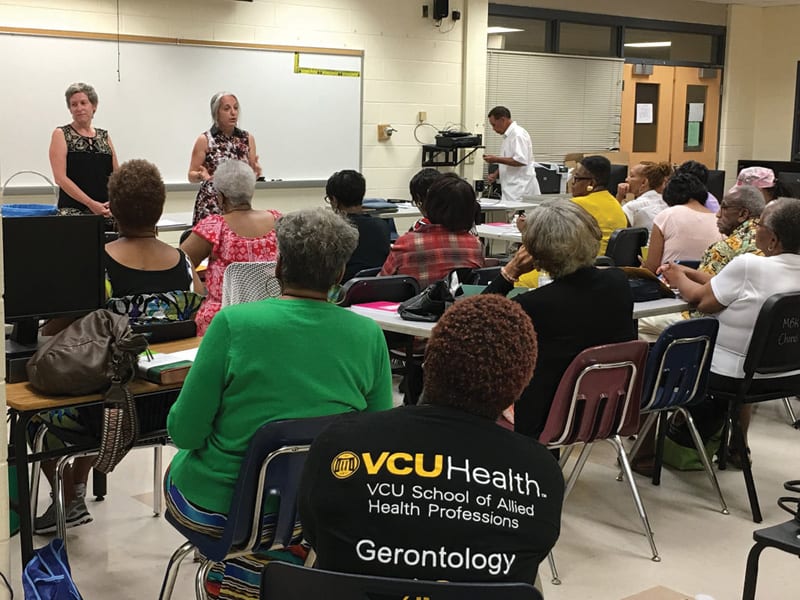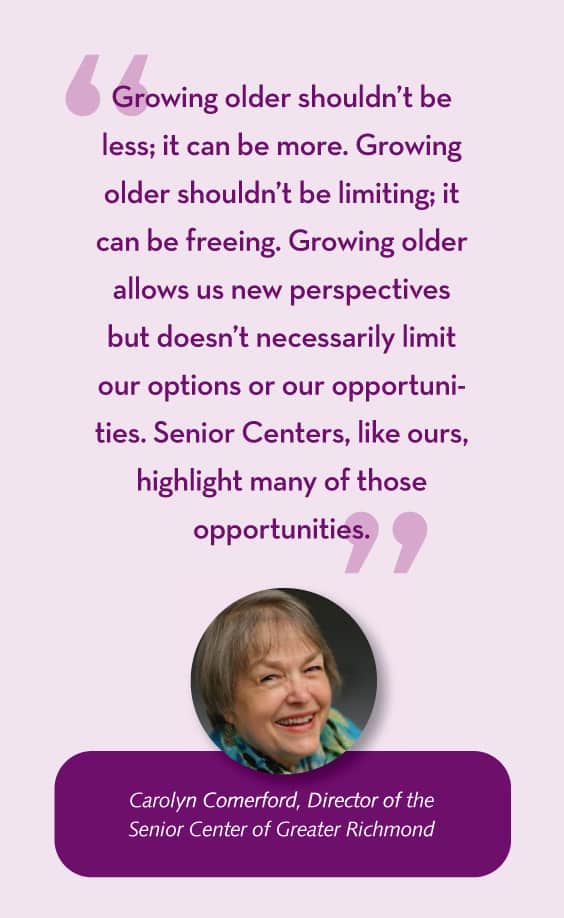Where Can Boomers Go for Answers?
Local resources provide founts of relevant information

Who said painting by number was for children?
At paint parties held throughout the community, people of all ages filled in the blanks with large swaths of colors to create a vibrant outdoor mural. The rainbow-hued butterfly artwork that now welcomes visitors invited collaboration. It was designed to send a very specific message at the area’s hub for senior services: aging should be celebrated as well as supported.
The Transforming Perspectives mural on busy East Cary Street attracts attention to the agency and projects a positive image of growing older, said Thelma Bland Watson, executive director of Senior Connections, The Capital Area Agency on Aging.
The mural was a partnership with Genworth Financial and a local artist, Colleen Hall. Inspired by surveys and interviews with more than 150 seniors in the community, organizers hope the mural will increase the visibility of Senior Connections to promote awareness of the organization’s access to hundreds of community resources, which include “the resources we have in older adults themselves,” Watson said.
With a mission of “empowering seniors to live with dignity and choice,” Senior Connections offers a range of home and community-based services in the greater Richmond area for older adults, caregivers and persons with disabilities.
The area’s population of older adults is growing and “what we are trying to do is use resources we have to the maximum extent possible.” said Watson. “We are always looking at ways to fill the gaps. The way we deliver services is changing so that we empower older adults and caregivers to use the existing services more effectively.”
The organization responds to requests for assistance by providing the information and assistance sought, or by referrals to appropriate community resources for comprehensive services that include family caregiver support groups, health and wellness programs, nursing care, transportation, home repair programs, mental health, and independent and subsidized housing.
STATEWIDE VIRTUAL PROGRAM

Service delivery is improving with the organization’s use of Virginia’s No Wrong Door, a virtual system and statewide network of shared resources designed to streamline access to long-term services and help connect individuals, providers and communities across the Commonwealth, says Watson.
“We can make referrals between the agencies in our area to people who don’t always know exactly where to go, but they may come across our number or one of our partners. Sometimes in the past when people have called us, we may have given them the number and said ‘Call the Alzheimer’s Association,’ but we really never had the means to follow up to make sure they were able to get through and if they were able to get the services from the Alzheimer’s Association.”
No Wrong Door changes all of that. With a click of a button, partners can share electronic referrals. The program offers a virtual, single point of entry for accessing home- and community-based services across the state for older adults, individuals with disabilities and family caregivers. Connected by a secure web-based system, partners are able to share data, make electronic automated referrals between providers, track individual progress and access reports to measure outcomes.
The system provides access to more than 23,000 unique services and programs statewide, which helps providers to save time and money. It operates under the federal guidelines of HIPAA and the state guidelines of the Office of the Attorney General.
Prior to No Wrong Door, when multiple entry points were needed to access long-term support services, people often fell through the cracks between referral point and enrollment. Older adults also had to provide the same information to each provider. Another shortcoming included referrals not always based on choice, but the coordinator’s knowledge.
Partner groups using the technology in the Richmond region:
- A Grace Place Adult Care Center
- Alzheimer’s Association – Greater Richmond Chapter
- Circle Center Adult Day Services
- Family Lifeline
- FeedMore/Meals on Wheels
- Hanover Adult Center
- Humankind
- Jewish Family Services (JFS)
- Open Door Resource Center, Inc.
- Rebuilding Together – Richmond
- Resources for Independent Living
- Riverside Pace
- South Richmond Adult Day Care Center
- United Spinal Association of Virginia
- Virginia Poverty Law Center
FINDING LIFELONG LEARNING OPTIONS
Older adults with a love of learning can pursue a variety of courses for free and without any entrance requirements. Under the Senior Citizens Higher Education Act, Virginians age 60 and older may audit courses in any Virginia institution of higher education. Depending on income, seniors may be able to take free classes for credit.
Other programs geared to seniors include the Osher Lifelong Learning Institute at the University of Richmond, which offers credit courses, special-interest minicourses and community service projects, for a membership fee. The Lifelong Learning Institute in Chesterfield, another member-supported learning community of adults 50 and older, is committed to ongoing education, fitness and social enrichment.
For adults 50 and older, the Shepherd’s Center of Richmond (TSCOR) is a nonprofit, service and education organization that offers intellectual opportunities and social interaction through its Open University. Courses include foreign languages, literature, political science, art, music, philosophy and estate planning as well as volunteer opportunities, especially in the area of leadership.

Seniors interested in learning more about their current life stage can do so at Virginia Commonwealth University, says E. Ayn Welleford, a gerontologist and chair of the Department of Gerontology, School of Allied Health Professions at Virginia Commonwealth University.
VCU offers a two-hour or six-week educational program on planning for your elderhood, which involves the roles of “wisdom giving, legacy creation and peace making,” said Welleford, also an associate professor. “We’re looking for people to participate in the six-week program, and we’re also looking for sponsors. If we get enough sponsors, then it will be free for the attendees.”
Anyone interested in either program should contact agingstudies@vcu.edu for more information.
MORE SENIOR ENGAGEMENT
By 2035 – for the first time – the Richmond area will be home to more adults ages 65 and older than school-age children, which raises the question: Are there enough resources for older residents?
“No, we don’t have enough resources. That’s why we need more older people out there participating in the communities and making their own plans about how they want to grow old and participating in those plans,” says Welleford. “I think there are a lot of people talking about, ‘What are we going to do about all these older people?’ That’s the wrong conversation. We wouldn’t say that about any other segment of the population.
“What we need to do is change the script, because the ageism that is so rampant interferes with people aging well and people being planful about their own late life, which can be a great and wonderful time of life.”
Robin Farmer, an award-winning journalist with more than 25 years’ experience, has worked as a staff writer for The Hartford Courant and the Richmond Times-Dispatch. She also writes fiction and is working on her debut YA novel.


